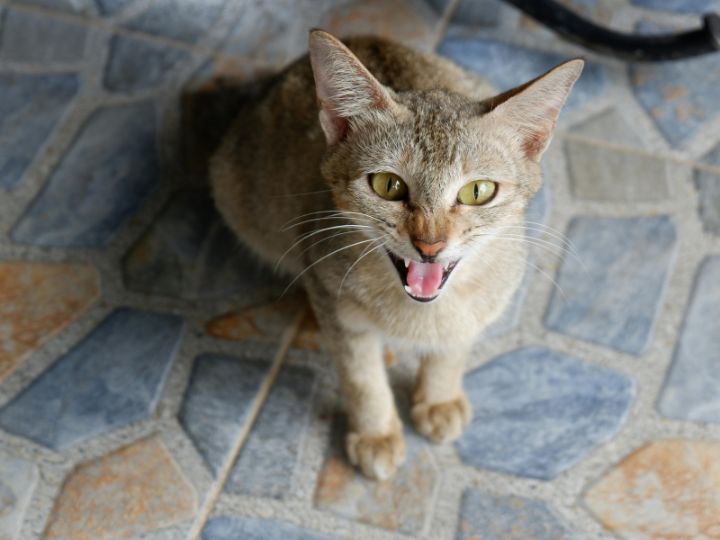You’re relaxing at home when your cat suddenly lets out a sharp, snake-like hiss and you’re left wondering what went wrong. It might seem aggressive, but hissing is often your cat’s way of expressing fear, pain, or stress. Understanding this defensive behavior is the first step to building trust and restoring calm. So, what’s really going on and why is my cat hissing all of a sudden on me?
If your cat is suddenly hissing at you, it’s likely reacting to fear, pain, or stress. Hissing is usually a defensive behavior not a sign of aggression. Give your cat space, watch for triggers like sudden movements or discomfort, and consider a vet check to rule out any medical issues.
To truly understand this sudden change in behavior, let’s break down what cat hissing really is and what it’s trying to tell you.
What is Cat Hissing?
Cat hissing is a sharp, forceful sound that resembles a snake’s hiss or air escaping a tire. It happens when a cat pushes air rapidly through its open mouth, often as a warning. If you’re close, you might even feel the burst of air.
The hiss can vary from a quiet, open-mouth warning to a loud, spit-filled reaction. It’s usually paired with defensive body language like:
- Curled tongue and open mouth
- Flattened ears
- Arched back
- Raised fur (piloerection)
This is your cat’s way of saying: “Back off!”
Why Do Cats Hiss?
1. Fear or Threat Perception
Cats hiss when they feel unsafe. Loud noises, strangers, or sudden movements can trigger this defensive sound. It’s a natural reaction to fear.
2. Territorial Aggression
Cats are highly territorial. When another animal enters their perceived space like a new pet or even a neighborhood cat seen through a window, they may hiss to defend their domain.
3. Pain or Illness
Sometimes, a cat hisses because it’s in pain or not feeling well. If your cat suddenly starts hissing when touched or picked up, it could be a sign of an injury or health issue.
4. Overstimulation
Some cats enjoy petting until they don’t. If your cat hisses during affection or play, it may mean they’re overstimulated and need a break.
5. Introducing a New Pet
Whether it’s another cat, a dog, or even a new kitten, hissing is common when your cat feels threatened or insecure about a newcomer in the home.
6. Past Trauma or Abuse
Cats that have been abused or poorly socialized may hiss more frequently. It’s a defensive mechanism from living in fear.
7. Redirected Aggression
If a cat sees something it can’t reach (like another cat outside) and gets agitated, it may hiss at whoever is nearby human or animal.
Hissing in Older Cats: A Sign of Age-Related Stress
Older cats may become more reactive as they age. Diminished vision, arthritis, or hearing loss can make them more prone to fear and discomfort.
They may hiss:
- When touched in sore spots
- If startled by someone approaching silently
- During changes in routine that cause confusion
Be gentle with senior cats. Provide easy access to litter, soft bedding, and minimal noise during transitions.
Why Is My Cat Hissing at Other Cats or Kittens?
Seeing one cat hiss at another isn’t unusual. It’s actually how cats set boundaries and communicate limits, especially in multi-cat homes.
Common triggers include:
- Invading personal space
- Playing too roughly
- Competing over food or litter boxes
- Reacting to new scents or behaviors
- Feeling stressed or crowded
Hissing between cats is often temporary, especially if one is new to the home. As long as there’s no fighting, give them time to adjust.
Older Cat Hissing at a New Kitten – Should You Worry?
It’s very common for an older cat to hiss at a new kitten. It doesn’t mean they hate the kitten it just means the older cat feels unsure or annoyed.
Why it happens:
- Kittens often play too roughly or don’t respect boundaries
- The older cat may feel displaced or overstimulated
- Their scent and energy are unfamiliar
- They may be trying to teach social rules
When to worry:
Hissing turns to growling, chasing, or swatting
One cat is hiding constantly or stops eating
You notice stress behaviors like peeing outside the litter box
What helps:
- Scent swapping (rub a cloth on each cat, then switch)
- Feeding them on opposite sides of a closed door
- Giving them separate safe zones
- Slowly increasing supervised interaction
Cats Hissing During Vet Visits or Travel
Even the calmest cats may hiss at the vet or in a carrier. These situations are filled with unfamiliar smells, loud noises, and physical restraint, which can feel threatening.
Common Situations Where Cats Hiss
Hissing is a natural feline response to stress, discomfort, or fear. You’ll often notice it in situations like car rides, being placed in a carrier, vet exams, nail trims, or during grooming and bathing. These moments can be overwhelming, especially for sensitive or anxious cats.
What Can Help Calm a Hissing Cat?
Give your cat space and time to settle on their own. Use calming aids like Feliway spray, soft blankets with familiar scents, and speak in a gentle tone. Avoid touching or approaching until they feel safe again.
What to Do When Your Cat Hisses
First and foremost, don’t panic and never punish your cat for hissing. Hissing is a sign of discomfort, not bad behavior.
- Give your cat space to retreat and calm down on their own terms.
- Avoid touching them; even normally affectionate cats may lash out when stressed.
- Try to identify the trigger: was it a loud noise, another animal, or a specific touch?
- Once they’ve calmed down, use positive reinforcement like treats or soft praise to rebuild trust.
If your cat starts hissing frequently or without a clear cause, it’s best to visit the vet to rule out pain or illness.
What Not to Do
- Don’t yell or scold this will only increase fear and anxiety.
- Don’t hiss back though it might seem like mimicking their behavior helps, it can actually escalate the situation or damage your bond.
FAQs
Do cats hiss during play?
Yes, cats can hiss during play, especially if the play becomes too rough or overwhelming. It’s a warning sign that your cat feels uncomfortable or overstimulated and needs a break. Always watch for body language and pause play if hissing starts.
Should I hiss at my cat when they bites me?
No, hissing at your cat is not recommended. It can scare or confuse them, making the behavior worse or harming your bond. Instead, calmly stop interaction, redirect with toys, and reinforce gentle behavior through positive training.
Is hissing always bad?
No, hissing isn’t always bad it’s a natural way for cats to express fear, discomfort, or the need for space. It’s a warning, not aggression, and helps prevent actual conflict.
Conclusion
Cat hissing may sound scary, but it’s actually your feline’s way of saying: “I’m uncomfortable, please give me space.” Whether the cause is fear, pain, overstimulation, or age-related stress, your cat isn’t being mean, they’re just trying to cope.
With patience, understanding, and a calm response, most hissing fades over time, replaced by trust, confidence, and a happier home.



